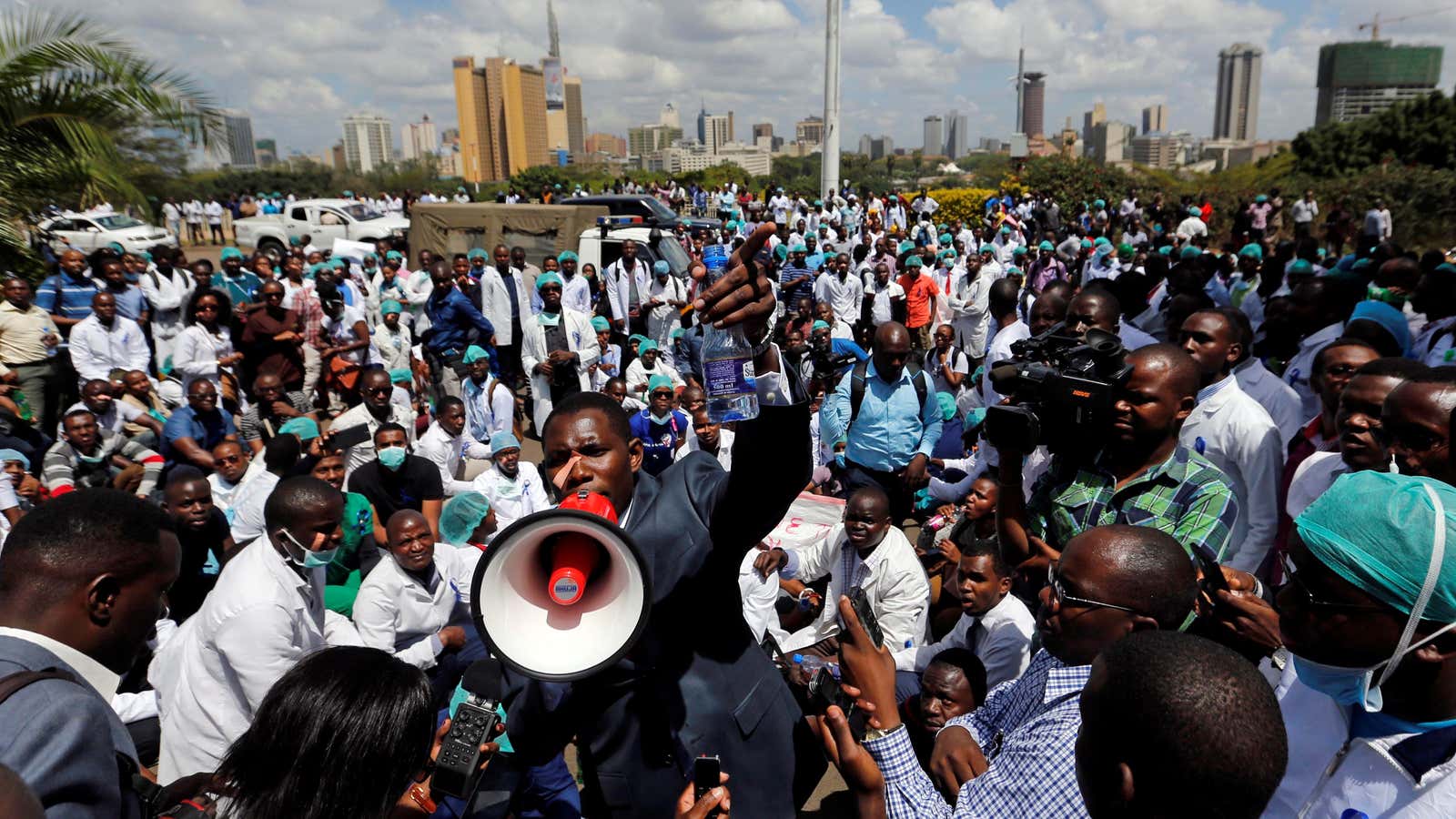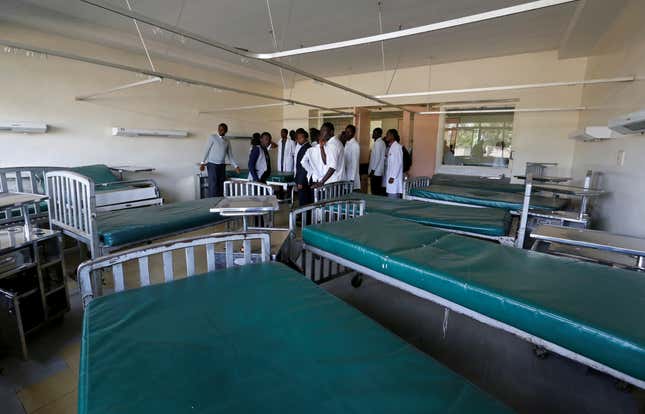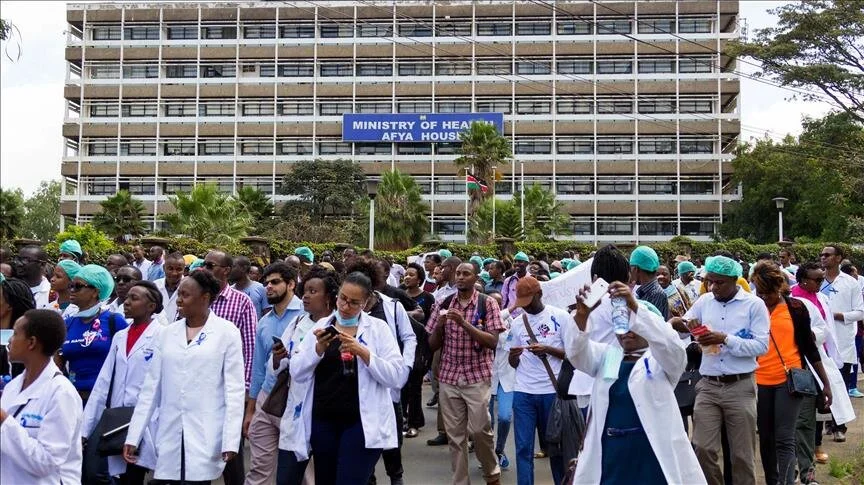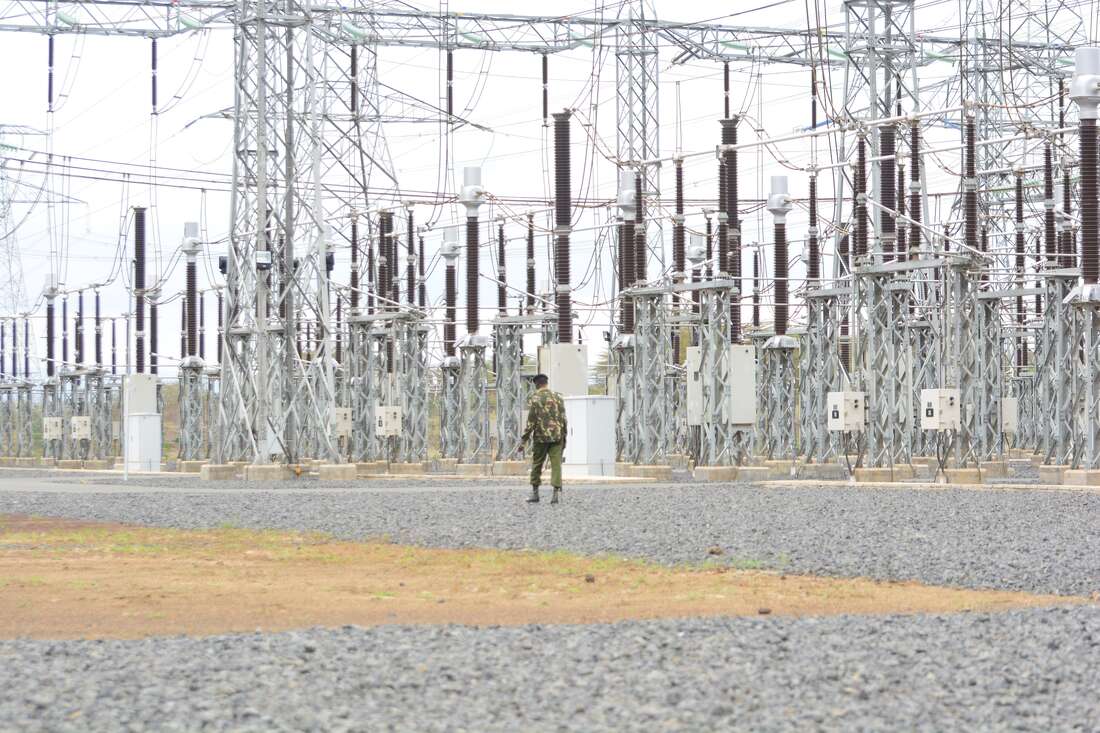Health services were crippled at Kenyatta National Hospital in the Kenyan capital Nairobi after 700 doctors went on strike protesting the indefinite suspension of a colleague after he performed brain surgery on the wrong patient sparking outrage in the country.
The head of the Kenya Medical Pharmacists and Dentists Union (KMPDU) Dr. Ouma Oluga condemned the suspension
“From today there will actually be no services at Kenyatta National Hospital, we are demanding the reinstatement of our colleague, unconditionally, we are saying that we want to be involved in any investigation that is going on so that the truth can come out,” Oluga said.
Oluga said that “mistakes happen” noting that the suspended doctor had been unwarrantedly victimized.
A statement from the doctors read: “The surgery was done on the wrong patient mainly because of wrong patient labeling by the ward staff. If you punish people for reporting or identifying errors, they will stop reporting them.”
Intern doctors in Meru have told the government to brace for the “grandmother of all protests” as the push for implementation of their 2017 Collective Bargaining Agreement gains momentum in counties.
The doctors held peaceful demonstrations on Tuesday within Meru town in solidarity with their colleagues in Nairobi.
“This is just a neonate of a demonstration; we are having a grandmother of demonstrations from today onwards and our salaries must be maintained, we must be given allowances,” they said through a spokesperson.
Among the issues contained in the 2017 CBA that they want implemented include their posting on permanent and pensionable terms and provision of comprehensive medical cover.
The Kenya Medical Practitioners and Dentists Union (KMPDU) called for the strike on March 14 accusing the government of backtracking on its pledge to implement all the promises they signed seven years ago after a historic 100-day strike.
Mediation interventions by the government have failed to reach a consensus with KMPDU Secretary General Devji Atellah saying the strike will hold until all their grievances are fully addressed.
The medical interns in Meru said they will not relent in their push to be categorised in the right job groups and condemned what they termed as a “radical decision” by the government to withdraw some of their allowances.
“We are not going to surrender, it’s not business as usual,” the doctors said and pointed out that the county’s medical facilities are understaffed and those on call are the intern doctors who are doing the bulk of the work.
The doctors who at some point broke into sorrowful songs appealed to President William Ruto, the Council of Governors and the Health Ministry to move with speed and arrest the impending crisis in public health facilities.
Kenya’s refusal to agree to the demands of striking doctors is making the country sick

The corridors of the Kenyatta National Hospital, Kenya’s oldest hospital, and its largest teaching and referral institution, are deserted and empty. That’s because of the doctors’ strike, which has now lasted a record 52 days–and with no end in sight. The striking medical practitioners want a 300% pay rise from their current $1,350 monthly salary and walked off the job in December after the government refused to implement a three-year-old joint collective bargaining agreement.
The doctors are not the only group of workers striking in Kenya. Last week, lecturers at public universities joined the doctors, refusing to teach over poor pay. In December, nurses also went on strike, demanding better wages and asking the government to streamline the disparities between those working for the county and national governments. In October, pilots from Kenya Airways delayed plans to strike if top executives from the national carrier didn’t resign. And after years of recurring protests and disruption to education, teachers in June signed a four-year deal that will see them receive salary increments and allowances.
For disgruntled employees, striking has become the rule rather than the norm. Faced with a wilful government and court injunctions ordering them back to work, some of the doctors have even opted to stay put and risk imprisonment. And just like in the past, the strikes have put a strain on the economy, leading to the loss of earning hours, much-needed revenue, and the loss of human lives.

The protests are deepened by the corruption scandals that have bedeviled the Kenyan government. While the government insists it cannot afford to meet the doctors’ demands, an internal audit from the ministry of health last year showed more than 5 billion shillings (around $55 million) in diverted funds. In 2015, half the proceeds from a $2.75 billion Eurobond, which marked the country’s debut in the international bond market, also went missing.
Other graft scandals have shown the purchase of $1,000 wheelbarrows, spending $4,400 on 18 custom-made condom dispensers and $85 on a ballpoint pen. And while hospitals continue to lack essential drugs and medical equipment, the country’s lawmakers continue to bag handsome salaries—among the highest in the world. Over the years, thousands of doctors and nurses have also left the country, seeking greener pastures in countries like the United Kingdom, Canada, Australia and South Africa.
“You see a lot of human suffering” in public hospitals, says Mwachonda Chibanzi, the deputy secretary general for the Kenya medical practitioners, pharmacists and dentists’ union. And it is “unfortunate,” he said, that those “advocating for rights, not just for doctors but also for the greater public” are threatened with jail. Mwachonda is one of the several leaders facing jail time today (Jan. 26) if they fail to call off the strike.
The government has also repeatedly failed to put the CBA into effect and address the collective bargaining rights of workers and unions. This impasse has only exacerbated the problem, with president Uhuru Kenyatta’s government threatening to not only fire the doctors but also arrange plans to hire doctors from India and Cuba.ADVERTISEMENT
Across Africa, this lack of proactive engagement with essential emergency professionals, of not responding until people’s lives are at stake, is a major concern in labor strikes, according to a 2012 Brookings Institution. Since the beginning of the strike, Kenya’s government has offered doctors a 40% salary increase, which they have rejected.
For now, social media has become the avenue for doctors—and those who agree or disagree with them—to express their grievances. The hashtag #MyBadDoctorExperience has been used to share insider stories of frustration and a decaying health system.
“We know that if there is a doctor who is working more than any other doctor, it’s the intern doctor. The government has dared reduce our salaries by 91 percent…we shall not accept any reductions in salaries.”
The protests in Meru were held concurrently with similar processions in Nakuru town where medics also held sit-ins outside Governor Susan Kihika’s office to push for the same agenda.








